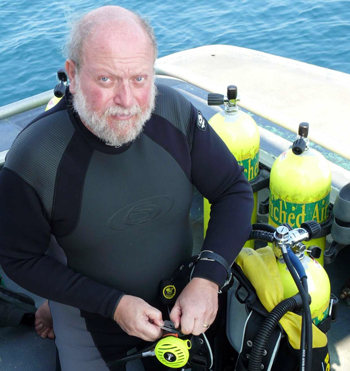Florida State appoints renowned marine scientist as 'Mote Eminent Scholar' in fisheries ecology

The Florida State University Department of Biological Science has named distinguished marine scientist Peter J. Auster of the University of Connecticut to its William R. and Lenore Mote Eminent Scholar Chair in Fisheries Ecology for 2010-2011. Auster began the yearlong appointment on August 23.
"Dr. Auster — even after three decades of diving from the deep lakes of Africa to the reefs of Bonaire — remains, remarkably, in spirit and action, that inquisitive kid who grabs every opportunity to explore and understand the biological diversity of this planet," said FSU Coastal and Marine Laboratory Director Felicia Coleman.
Auster is a research professor in the Department of Marine Sciences at the University of Connecticut, where he holds a joint appointment in the Department of Natural Resources and the Environment, and also serves as the science director for the Northeast Underwater Research Technology and Education Center (formerly the National Undersea Research Center for the North Atlantic and Great Lakes).
In recognition of his extraordinary dedication to studying the ecology of the Stellwagen Bank National Marine Sanctuary, an 842-square-mile stretch of open water at the mouth of Massachusetts Bay, Auster earned an Environmental Hero Award in 2000 from the National Oceanic and Atmospheric Administration (NOAA).
"We are delighted that this esteemed international researcher will join us this fall at Florida State to explore uncharted territory in the northeastern Gulf of Mexico and lecture on ecosystem-based conservation and management to our undergraduate and graduate students," Coleman said.
As the eighth visiting professor to serve as Mote Eminent Scholar at FSU, Auster also will spend a portion of the year at the Mote Marine Laboratory in Sarasota.
Auster's research focuses on the ecology and conservation of fishes, and it spans the globe.
Over the past 25 years he has served as a scientist or chief scientist on more than 35 major research cruises and myriad day trips in the northwest Atlantic, Gulf of Alaska, Caribbean Sea, Indian Ocean, South China Sea, Sea of Cortez and equatorial Pacific. His work has examined the ways in which variation in behavior and patterns of habitat use across underwater landscapes affect the distribution and abundance of fish. His research goals include gaining a better understanding of fishing's ecological effects and establishing a scientific basis for utilizing marine protected areas as conservation tools.
Much as wildlife biologists do on land, in the water Auster directly observes the ways in which individual animals respond to variations in nature. He employs scuba diving, research submersibles, and remotely operated or autonomous vehicles for his deep-sea work, which has generated findings that have appeared in more than 120 scholarly and technical publications. He serves on several panels and committees that are focused on marine resource management and conservation, and he participates in numerous outreach initiatives aimed at informing the public about marine conservation issues.
Auster received his doctorate in zoology in 2000 from National University of Ireland-Galway and his master's degree in biological oceanography in 1985 from the University of Connecticut.
The William R. and Lenore Mote Endowment in Fisheries Ecology and Enhancement was established for Florida State University's Department of Biological Science in 1994 with a gift from the late William Russell Mote of Sarasota, a dedicated conservationist and avid fisherman. In addition to expanded research experiences for FSU undergraduate students in biology, the endowment supports international symposia on critical marine resource issues to further the understanding, conservation and management of the world's marine fisheries.

"Dr. Auster…remains, remarkably, in spirit and action, that inquisitive kid who grabs every opportunity to explore and understand the biological diversity of this planet."
Felicia Coleman
Florida State University Coastal and Marine Laboratory
